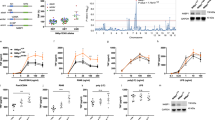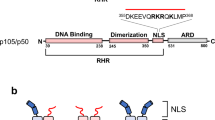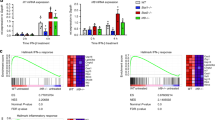Abstract
INDUCIBLE gene expression in eukaryotes is mainly controlled by the activity of transcriptional activator proteins, such as NF-κB (refs 1–3), a factor activated upon treatment of cells with phorbolesters, lipopolysaccharide4, interleukin-1 and tumour necrosis factor-α5. Activation of NF-κB involves release of the inhibitory sub-unit IκB from a cytoplasmic complex with the DNA-binding subunits Rel-A (formerly p65) and p50 (refs 6, 7). Cell-free experiments have suggested that protein kinase C and other kinases transfer phosphoryl groups onto IκB causing release of IκB and subsequent activation of NF-κB8–10. Here we report that IκB-α (formerly MAD-3)11 is degraded in cells after stimulation with phorbol ester, interleukin-1, lipopolysaccharide and tumour necrosis factor-α, an event coincident with the appearance of active NF-κB. Treatment of cells with various protease inhibitors or an antioxidant completely prevented the inducible decay of IκB-α as well as the activation of NFκcB. Our findings suggest that the activation of NF-κB relies on an inducible degradation of IκB-α through a cytoplasmic, chymotrypsin-like protease. In intact cells, phosphorylation of IκB-α is apparently not sufficient for activation of NF-κB.
This is a preview of subscription content, access via your institution
Access options
Subscribe to this journal
Receive 51 print issues and online access
$199.00 per year
only $3.90 per issue
Buy this article
- Purchase on Springer Link
- Instant access to full article PDF
Prices may be subject to local taxes which are calculated during checkout
Similar content being viewed by others
References
Blank, V., Kourilsky, P. & Israel, A. Trends biochem. Sci. 17, 135–140 (1992).
Nolan, G. P. & Baltimore, D. Curr. Opin. Genet. Dev. 2, 211–220 (1992).
Grimm, S. & Baeuerle, P. A. Biochem. J. 290, 297–308 (1993).
Sen, R. & Baltimore, D. Cell 47, 921–928 (1986).
Osborn, L., Kunkel, S. & Nabel, G. J. Proc. natn. Acad. Sci. U.S.A. 86, 2336–2340 (1989).
Baeuerle, P. A. & Baltimore, D. Cell 53, 211–217 (1988).
Baeuerle, P. A. & Baltimore, D. Science 242, 540–546 (1988).
Shirakawa, F. & Mizel, S. Molec. cell. Biol. 9, 2424–2430 (1989).
Ghosh, S. & Baltimore, D. Nature 344, 678–682 (1990).
Kerr, L. D. et al. Genes Dev. 5, 1464–1476 (1991).
Haskill, S. et al. Cell 65, 1281–1289 (1991).
Brown, K., Park, S., Kanno, T., Franzoso, G. & Siebenlist, U. Proc. natn. Acad. Sci. U.S.A. 90, 2532–2536 (1993).
Sun, S. C., Ganchi, P. A., Ballard, W. & Greene, W. C. Science 259, 1912–1915 (1993).
de Martin, R. et al. EMBO J. (in the press).
Bomsztyk, K. et al. Cell. Regul. 2, 329–337 (1991).
Meichle, A., Schütze, S., Hensel, G., Brunsing, D. & Krönke, M. J. biol. Chem. 265, 8339–8347 (1990).
Schütze, S. et al. Cell 71, 765–776 (1992).
Schreck, R., Rieber, P. & Baeuerle, P. A. EMBO J. 10, 2247–2258 (1991).
Schreck, R., Albermann, K. & Baeuerle, P. A. Free Rad. Res. Commun. 17, 221–237 (1992).
Schreck, R., Meier, B., Männel, D., Dröge, W. & Baeuerle, P. A. J. exp. Med. 175, 1181–1194 (1992).
Meyer, M., Schreck, R. & Baeuerle, P. A. EMBO J. (in the press).
Baeuerle, P. A., Lenardo, M., Pierce, J. W. & Baltimore, D. Cold Spring Harb. Symp. quant. Biol. 53, 786–798 (1988).
Zabel, U., Henkel, T., dos Santos Silva, M. A. & Baeuerle, P. A. EMBO J. 12, 201–211 (1993).
Zabel, U. & Baeuerle, P. A. Cell 61, 255–265 (1990).
Hochstrasser, M. & Varshavsky, A. Cell 61, 697–708 (1990).
Baeuerle, P. A. & Baltimore, D. in Molecular Aspects of Cellular Regulation Vol. 6 (eds Cohen, P. & Foulkes, J. G.) 409–432 (Elsevier/North Holland Biomedical, 1991).
Zabel, U., Henkel, T., dos Santos Silva, M. A. & Baeuerle, P. A. EMBO J. 12, 201–211 (1993).
Henkel, T. et al. Cell 68, 1121–1133 (1992).
Wall, R. et al. Proc. natn. Acad. Sci. U.S.A. 83, 295–298 (1986).
Schreck, R. & Baeuerle, P. A. Meth. Enzym. (in the press).
Author information
Authors and Affiliations
Rights and permissions
About this article
Cite this article
Henkel, T., Machleidt, T., Alkalay, I. et al. Rapid proteolysis of IκB-α is necessary for activation of transcription factor NF-κB. Nature 365, 182–185 (1993). https://doi.org/10.1038/365182a0
Received:
Accepted:
Issue Date:
DOI: https://doi.org/10.1038/365182a0
This article is cited by
-
Temperature-induced embryonic diapause in chickens is mediated by PKC-NF-κB-IRF1 signaling
BMC Biology (2023)
-
IKBA phosphorylation governs human sperm motility through ACC-mediated fatty acid beta-oxidation
Communications Biology (2023)
-
Itch and autophagy-mediated NF-κB activation contributes to inhibition of cathepsin D-induced sensitizing effect on anticancer drugs
Cell Death & Disease (2022)
-
IκBα is required for full transcriptional induction of some NFκB-regulated genes in response to TNF in MCF-7 cells
npj Systems Biology and Applications (2021)
-
HOPS/Tmub1 involvement in the NF-kB-mediated inflammatory response through the modulation of TRAF6
Cell Death & Disease (2020)
Comments
By submitting a comment you agree to abide by our Terms and Community Guidelines. If you find something abusive or that does not comply with our terms or guidelines please flag it as inappropriate.



